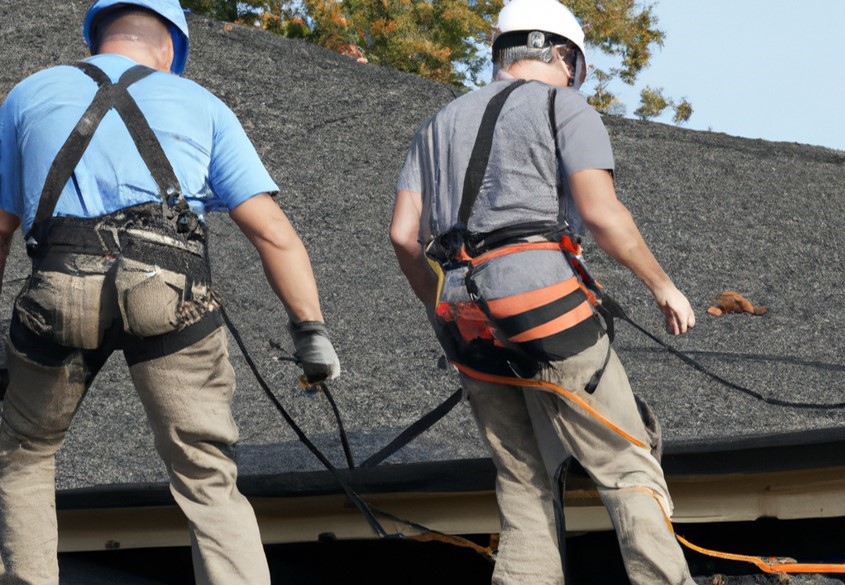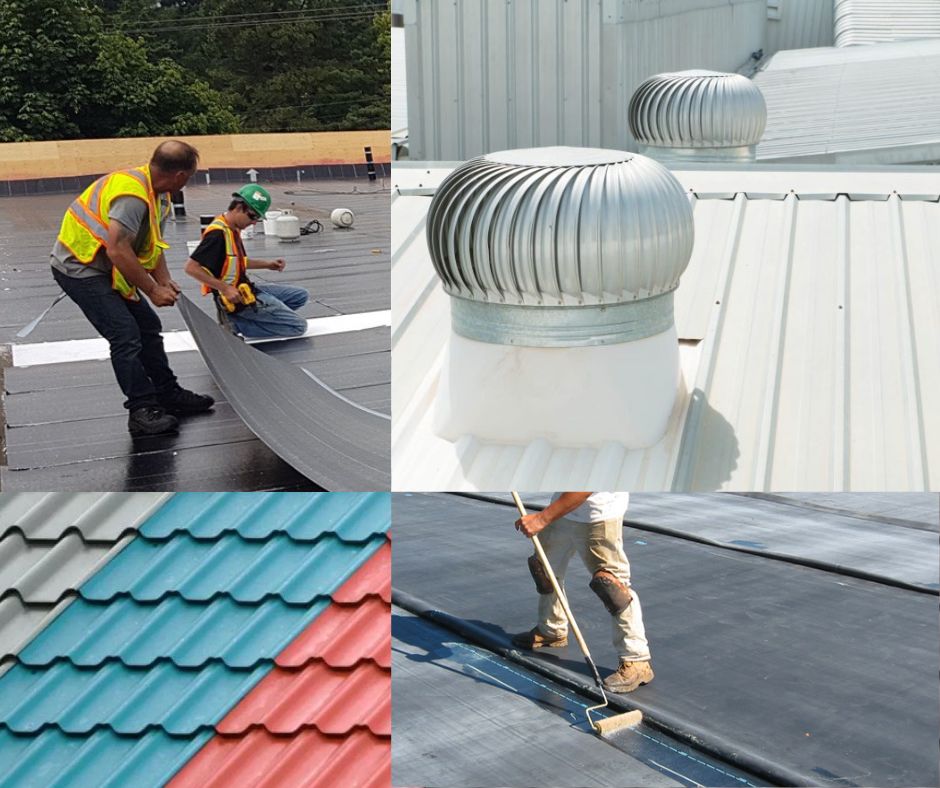
Tupac de la Cruz, Roofing Solutions
31 Oct 2023
As the owner of a brick-and-mortar business, building maintenance is a vital aspect of protecting your company. Regarding your roof, you can plan ahead by anticipating how much longer your commercial roof will last. You can also prepare by determining whether you’ll stick with your current roofing materials or switch to a more durable type when it’s time for a replacement.

Choosing between the various commercial roofing materials is an important decision because it can affect your short-term and long-term operating expenses. Often, paying a higher upfront cost for your new roof is worthwhile if it means installing a more durable one that lasts longer. This strategy will help you save on roof maintenance costs over time.
You might also want to consider energy efficiency in choosing the best roofing material for your business. Since most commercial buildings don’t have insulated attics, your business’ roof may be the only barrier to control the effects of outdoor temperatures.
You will also have to consider the shape of your roof when you choose new roofing materials for your business. While some commercial buildings have steep slopes similar to traditional residential roofs, most follow a similar plan. Flat roofs are prevalent, and you’ll see low-slope roof designs on many commercial buildings.
While many different types of roof materials are available, five options stand out. These options offer the best roofing materials for cost, durability, energy efficiency, and longevity.
As you look for roofing options for your business, you’ll find that commercial metal roofing is one of the most popular choices. A metal roof is easy to install, so the installation is quick and comes with lower upfront costs. Once updated, a metal roof enhances the curb appeal of any business.
When reviewing a roofing materials list, you’ll find that metal is more resilient. It stands up against harsh weather conditions and lasts 40 to 70 years.
It’s necessary to note that metal reacts to extreme temperature changes. The material will expand when exposed to summer heat and contract when the temperatures drop in the fall and winter. In choosing a metal roof, you’ll have to take this natural process into account.
There are two types of metal roofs: standing seam and screw-down metal. A standing seam roof costs $12 to $16 per square foot. However, this system allows the roof metal to expand and contract without affecting the protection the roof offers.
While a screw-down roof only costs $4 to $6 per square foot, it’s installed in a fixed position. As the expansion and contraction of the materials occurs, screws and washers will get damaged. That creates a need to routinely replace these components, increasing the demand for consistent maintenance.
You can also choose steel, aluminum, and galvalume for your metal roof. Each material comes in various thickness levels to meet the unique needs of commercial businesses. While aluminum and steel require painted finishes, a Galvalume steel roof doesn’t need an added finish.
Another one of the more popular roof materials is SBS (styrene-butadiene-styrene) modified bitumen roofing. An SBS roof is best on a flat commercial building but is also an effective material for low-sloping roofs. The material comes from a composite of asphalt and rubber, creating a durable surface that lasts 20-30 years.
The most significant advantage of an SBS roof is that the installation is safer than that of a hot tar roof. Although hot tar is one method for installing several types of roofing materials, including an SBS roof, it’s not the only method. Commercial roofers can install an SBS roof with cold tar or a torch for a safer application process. Self-adhesive materials are also helpful in installing SBS roofing.
Due to the extensive labor involved in installing and repairing SBS roofing, the upfront installation and long-term maintenance costs are higher. However, the material is highly resistant to extreme temperatures, moisture, and abrasions. Due to this high durability, the need for repairs is rare.
An SBS roof is ideal for a flat roof exposed to frequent foot traffic. If your business includes a rooftop venue, this is probably the best option. It will allow you to use the space without worrying about heavy foot traffic damaging the roofing material.
If energy efficiency is a concern in choosing the best roofing material for your business, a TPO (thermoplastic polyolefin) system is your best option. A TPO roofing system consists of a white membrane, which causes the roof to reflect heat rather than absorb it. That will keep your roof and the interior of your building cooler.
A TPO roof is highly preferred among the different types of roofing material for commercial buildings due to its energy efficiency. In addition, you can order a TPO roof in various thicknesses for added protection. Manufacturers offer more extended warranties for thicker TPO roofing systems. This type of roof is one of the lower-cost options for flat commercial roofs, ranging between $4 and $10 per square foot.
Thermoplastic polyolefin protects against tears, punctures, and abrasions, making it durable and long-lasting. On average, a TPO roof will last from 20 to 30 years. It’s also a nonporous material, so it won’t support mold growth. In addition to its natural white appearance, you can also order TPO roofing in gray or black.
Several different roofing materials are available under the category of tile roofing. These materials include clay, concrete, slate, and metal. Each type of material offers a different range of benefits, so it’s important to choose the material that best meets your commercial roofing needs.
A tile roof consists of individual tiles layered in a cascading fashion to prevent moisture and debris from accessing the underlying materials. Due to this layering process, a tile roof is not ideal for a flat roof. Instead, this is among the best options on any list of materials for roofing when dealing with a steep or low-sloped roof.
Clay tiles have been used for centuries and are still highly effective. Clay is a popular choice because it retains its color without fading. The color gets baked into each tile to resist the bleaching effects caused by the sun. Clay is easily molded into any shape. Due to these features, you can design a clay tile roof to match the color and style of any commercial building.
A somewhat newer design uses a concrete mixture in molding commercial roofing tiles. This process often involves mixing Portland cement, sand, and water to create the tiles. The manufacturer can also add color dyes to meet the customization needs of each customer.
The texture and shape of the tiles are also easy to modify. Often, concrete tiles resemble wood shake, slate, or other tiling materials. While concrete isn’t quite as long-lasting as clay, it is an excellent choice for regions that experience high winds and hail storms regularly. The concrete stands up better against these environmental threats.
Slate is a more eco-friendly option because it comes from a natural source. The slate gets mined from natural stone quarries before it’s formed and marketed to commercial businesses. Although the customization options are somewhat limited when compared to concrete and clay tiles, there is some variety in the choice of colors.
Slate is highly durable and long-lasting, making it a better choice for long-term costs. It’s not uncommon for this type of roof to last up to 200 years. However, slate is also a heavier material. Your commercial roofing contractor can tell you if your building can support the heavier weight of a slate roof.
If you want the benefits of a metal roof with the design options that come with tile roofing, this option is for you. Metal roof tiles can be easily designed for color, shape, and texture. These customization options make it possible to create a unique and attractive commercial roof.
Additionally, you can choose from several types of metal. The most common options on the market are steel, aluminum, and copper. A metal tile roof is a great option when your building won’t support the weight of heavier tiles.
A list of the best modern roofing materials for commercial buildings wouldn’t be complete without mentioning asphalt shingles. While residential homes also use asphalt shingles, commercial roofers use upgraded or designer shingles for businesses. These shingles stand up better against high winds and other external forces.
A asphalt shingle roof lasts 15 to 30 years, while a commercial shingle roof has a lifespan of 25 to 35 years. There’s also a more comprehensive range of customization options in choosing the color, shape, and texture of the shingles.
Since asphalt shingles are widely available and easy to install, the upfront cost is considerably lower. If you own a home, you already know the basic maintenance needs of an asphalt commercial roof, making this one of the most accessible roofing material types to care for over its lifetime.
Often, a damaged asphalt roof is cheap and easy to repair. That’s because fixing this type of roof typically involves replacing a few shingles. Even if the underlying material has suffered moisture damage, replacing one section is still less expensive than replacing an entire TPO or SBS roofing system.
As with a tile roof, asphalt shingles are better for low or steep-sloped tops. The insulation of several layers of roofing materials helps to add to the roof’s thermal protection. This feature makes asphalt shingles another option for better energy efficiency.
Since this type of roof consists of small shingles layered over one another, this is an ideal option for roofs with multiple chimneys, large amounts of flashing, and commercial venting systems. Your contractor can cut the shingles to fit any tight or irregular space.
Roofing Solutions offers commercial roofing services throughout Alabama, Louisiana, and Mississippi. Fully licensed, bonded, and insured, our team views each new job as an opportunity to demonstrate our craftsmanship and commitment to excellence.
To schedule roofing maintenance or repair or to request an estimate for a new commercial roof replacement, contact our skilled commercial roof replacement roofers today!